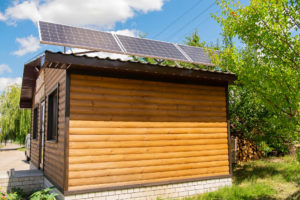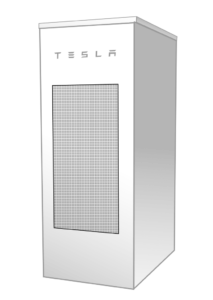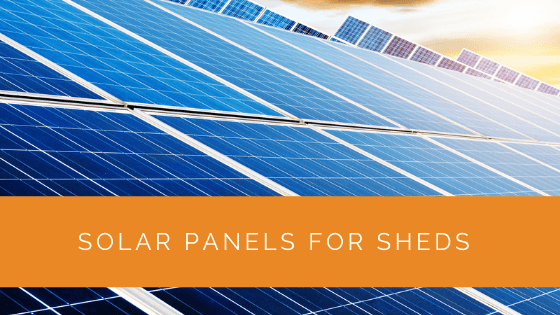Powering your home with renewable energy is now easier than ever before. With solar panels, wind turbines, and other green energy solutions available in the market, there is no need to rely on non-renewable energy anymore.
Many have shifted to solar power to save money and switch to a greener lifestyle. It is an excellent alternative to using the traditional electricity supply. Electricity generated by solar power is more reliable, environment-friendly, and eco-friendly than many other forms of energy. One of the most common questions asked is how to generate electricity from solar power. The short answer is solar panels, but choosing how many and what type can be tricky.
Are you a shed owner looking to reduce your energy costs? If so, solar panels may be the perfect solution for you! In this guide, we’ll discuss everything you need to know about solar panels for sheds, including what they are, how they work, and the benefits they offer.
Contents
- 1 Key Takeaways
- 2 Why Solar Panels?
- 3 How Do You Get Started?
- 4 Positioning of Your Solar Panels
- 5 Material Composition of Your Equipment
- 6 Advantages of Solar Panels for Sheds
- 7 Disadvantages of Solar Panels for Sheds
- 8 Tesla Solar Panels
- 9 Case Study: Implementing Solar Panels for a Residential Shed
- 10 Expert Insights From Our Solar Panel Installers About Solar Panels for Sheds
- 11 Discover the Power of Solar with Solar Panels Network
- 12 Wrapping Up
Key Takeaways
- Solar panels for sheds can help homeowners generate electricity and reduce energy costs, making them a practical choice for those with limited space or time for a full home installation.
- Proper positioning of solar panels is crucial for their efficiency, as they rely on sunlight. Shady locations or inadequate positioning, especially in regions with limited sunlight, can affect their performance.
- Investing in quality solar panel equipment and considering factors like power needs, equipment material composition, and positioning can lead to lower energy bills, eco-friendliness, and added value to your property.
Why Solar Panels?
Solar panels are a great way to generate electricity and save money on electricity bills. If you have a shed or an unused space in your garden, purchasing a solar panel for the shed could be the perfect way to get free power and give yourself more storage areas.
Solar panels should be used by homeowners who wish to generate electricity but do not have enough time or space to install solar panels. A shed roof space is a good location for installation because it is usually close enough to the house to run an electrical line back to your home easily. It benefits you with more freedom in setting up the solar kit as it will only have occasional use, unlike the other forms of green energy like wind turbines.
You may wonder if solar panels are worth the investment in your property. While it’s true that deciding to install solar panels requires some serious upfront costs, you’ll see an immediate return on your investment in the form of lower monthly energy bills.
A solar-powered shed is associated with a good investment and environmental betterment. If you are considering adding solar panels to your shed roof, here’s what you need to know about it.

How Do You Get Started?
If you want to start using solar energy, determine your power needs. The first step in selecting the right kind of solar panel for your needs is deciding how much power you need. A wattage chart will help you determine how much energy you need. On average, the annual consumption of UK homes is around 38,000 kWh.
All you need to do is work out the power rating of all the equipment you intend to consume and add them up to get the required wattage. The total amount of power will tell you the size of the solar panel you need to get installed to generate enough electricity to meet your demands for electrical items.
Tip: Make sure the cables show the correct rating for your system to accurately determine your power needs.
Positioning of Your Solar Panels
Before installing a solar panel at home, you need to be able to fulfil the requirements of a solar panel. The position of your garden sheds or roof determines the investment in your solar panel kit. Now, why is the position of solar panels important? Sunlight is the power source of solar panels to generate power. Hence, the more exposure to the sun, the more efficient your solar shed will work.
Likewise, if your shed is shady, the lack of sunlight, even on the brightest day, will limit the panel’s efficiency. Positioning is also crucial because of the winter months. This is because a UK-based solar-powered shed will suffer from a lack of sunlight, particularly in winter, if the positioning is not noted.
Material Composition of Your Equipment
The amount does not determine a good investment but rather the quality of your equipment. An ideal solar power kit will include solar panels, mounts, charge controller, connectors and floodlights.
A solar panel is made of solar cells and a glass casing in the front to add protection and durability of silicon. A good quality solar panel will have a protective back sheet and case attached for insulation and to limit humidity and heat dissipation.
Tip: Make sure you use an MCS-certified installer to ensure that the equipment is of good quality and safe to use.
Advantages of Solar Panels for Sheds
The roofs of sheds are a great way to utilise solar energy. A solar shed is a solar power system that uses solar panels to supply electricity and energy to your shed or home. It is one of the simplest and most efficient solar energy methods. You can use this energy for lighting in your shed.
This can help you save money on your electricity bill and contribute to a better environment in the long run. Some of the benefits of solar-powered sheds are
- Saves money on your energy bills
- High return on investment (ROI). While the initial cost of installation might sound a lot, it is beneficial in the long term.
- It can work as a backup power source in the event of a power outage or a natural disaster and as such.
- Eco-friendly.
- Easy maintenance.
- Adds value to your house.
Disadvantages of Solar Panels for Sheds
- The initial investment of the installation can be costly, depending on how much power you need.
- The shed’s structure and positioning should be able to support the requirements of the panels.
- Generating the power required throughout the year or in locations with less sun might be challenging.
Let’s understand this better with an example.
Tesla Solar Panels
In 2020, Tesla was the second-largest solar panel company in the US market share. Tesla, which created its base back in 2016, can be called one of the most prominent players in this domain. It offers unique and promising solar panels, solar roofs, and Powerwalls.

What Are Tesla Solar Panels About?
Solar energy generation comes down to solar panels in terms of functions. Tesla has always tried to offer people some modern and unique ideas.
Likewise, although the functioning of Tesla solar panels is similar to other solar panels, Tesla still manages to stand out from others by offering the following distinct features:
- Design: The design of Tesla’s solar panels focuses on giving a minimal and sleek look. The additional fittings and hardware are built to give the model an aesthetic appeal yet durable enough to last decades.
- Monitoring Feature: Another distinction Tesla’s models offer is the feature to monitor the solar power system via a mobile tracking app. Through this monitoring app, one can track the efficiency and production of the system.
- Economical: Tesla’s ordering process is entirely online-based, not to forget their online inspection of the housing area. These factors help them eliminate many added costs that the other solar companies face.
But Tesla doesn’t stop at just solar panels. It also offers solar roofs and Powerwalls to people. Solar roofs and Powerwalls are other media for generating friendly lights. Solar roofs are the revolutionised and more aesthetic version of solar panels.
Powerwalls, on the other hand, act as energy-storing batteries. In this case, solar energy. This battery system comes in handy during the winter months, power outages, rough weather, and during night times when sunlight is inaccessible.
Is It Worth Investing in Tesla Solar Panels and Roofs?
Standardised solar panels have been in the market for quite some time. With Tesla offering their unique and unconventional ideas, the competition among the companies increases.
Due to its online ordering process, Tesla boasts of lower prices, eliminating the salesperson’s need and doing away with overhead charges. And because of their large establishment, small losses are bearable despite giving their power tools at lower prices. However, other solar companies do not have the luxury of incurring such losses or expenses.
In terms of power generation, Tesla is more efficient as it offers a power backup system, Powerwalls. And thus, get an added advantage.
One primary concern of Tesla power tools is that they are not flexible or mobile. Unlike other solar power tools, Tesla’s solar panels and roofs cannot be transferred from one place to another because they are custom fit to your home.
Another con of Tesla might be its tacky customer service. Lower costs and aesthetics might give a solid impression of Tesla being the one, but unchecked customer complaints can cause significant losses to the customer. This may make many customers turn to some other solar company.
Case Study: Implementing Solar Panels for a Residential Shed
Background
A residential client approached Solar Panels Network, seeking to reduce energy costs and embrace renewable energy solutions. The client wanted to utilise the shed’s roof space for a solar panel installation to power garden tools, lighting, and other small electrical appliances. The primary goal was to explore an eco-friendly solution that could provide substantial savings on electricity bills.
Project Overview
The project involved designing and installing a solar panel system tailored to the client’s energy needs. The client had a medium-sized shed with ample roof space, ideally positioned to capture maximum sunlight. The main challenges included determining the optimal system size and ensuring the installation’s cost-effectiveness while meeting energy requirements.
Implementation
- Assessment and Design: We began with a detailed assessment of the client’s energy consumption patterns and the shed’s structural layout. We designed a solar panel system with appropriate capacity to meet the daily energy needs.
- Equipment Selection: Selected high-efficiency solar panels and an inverter compatible with the system’s scale. We also included a battery storage system to store excess energy generated during the day for use at night.
- Positioning and Installation: Positioned the panels on the shed’s roof to maximise sun exposure, avoiding potential shading issues from nearby trees. The installation process was smooth, taking two days to complete, including wiring and setup.
- Testing and Monitoring: Post-installation, we conducted thorough testing to ensure all components were functioning correctly and provided the client with a monitoring system to track energy production and usage.
Results
- Energy Savings: The solar panel system generated enough power to meet all the client’s needs for the shed, including powering tools and lighting, resulting in a significant reduction in electricity bills.
- Eco-friendly Solution: The installation helped the client reduce their carbon footprint, contributing to environmental sustainability.
- Cost-effective Installation: The project was completed within budget, providing a cost-effective solution with a high return on investment through energy savings.
Summary
This project showcased the practical benefits of installing solar panels on sheds, particularly for homeowners looking to start small with renewable energy. By leveraging available roof space, the client achieved considerable energy savings and enhanced their property’s eco-friendliness. The system’s success highlights the importance of proper design, equipment selection, and installation techniques to maximise efficiency and savings. The client was delighted with the seamless transition to solar power and the reduction in energy costs, affirming the value of this renewable energy solution.
Expert Insights From Our Solar Panel Installers About Solar Panels for Sheds
Installing solar panels on sheds is a fantastic way to harness renewable energy without the need for a full-scale roof installation. It’s ideal for homeowners looking to reduce energy costs and carbon footprint in a more compact, manageable way.
Renewable Energy Consultant
Positioning is key when installing solar panels on sheds. Ensuring maximum exposure to sunlight throughout the day can significantly impact the efficiency and energy output of the system. Always consider potential shading from nearby trees or buildings.
Senior Solar Installation Engineer
Shed installations are perfect for those starting with solar energy. It’s a smaller investment compared to home roof installations but still provides substantial benefits like lower electricity bills and backup power options.
Solar Systems Specialist
Discover the Power of Solar with Solar Panels Network
Are you navigating the world of solar installations? Look no further than Solar Panels Network, the UK’s trusted partner in harnessing the sun’s potential. Our dedication goes beyond just installations; we’re on a mission to transform how homeowners and businesses across the UK perceive and utilise energy. By choosing us, you’re reducing your carbon footprint and making a smart financial move that promises savings for years ahead. Contact us today and embark on your solar journey.
Wrapping Up
In conclusion, solar panels for sheds are a great idea to consider if you’re tired of high power bills and would like to save some money. There are many reasons why installing solar panels in your shed is a good decision, from saving money on your power bill to being environmentally friendly. We hope we’ve provided you with the information needed to make an informed decision about whether or not solar panels are suitable for your home.
About the Author
Solar Panels Network stands at the forefront of solar energy solutions, driven by a team of seasoned solar engineers and energy consultants. With over decades of experience in delivering high-quality solar installations and maintenance, we are committed to promoting sustainable energy through customer-centric, tailored solutions. Our articles reflect this commitment, crafted collaboratively by experts to provide accurate, up-to-date insights into solar technology, ensuring our readers are well-informed and empowered in their solar energy decisions.

